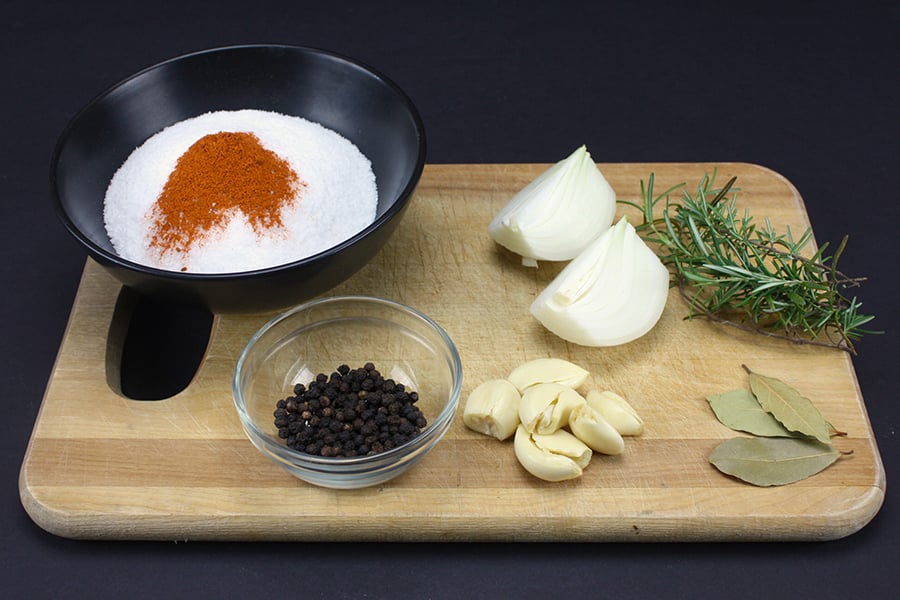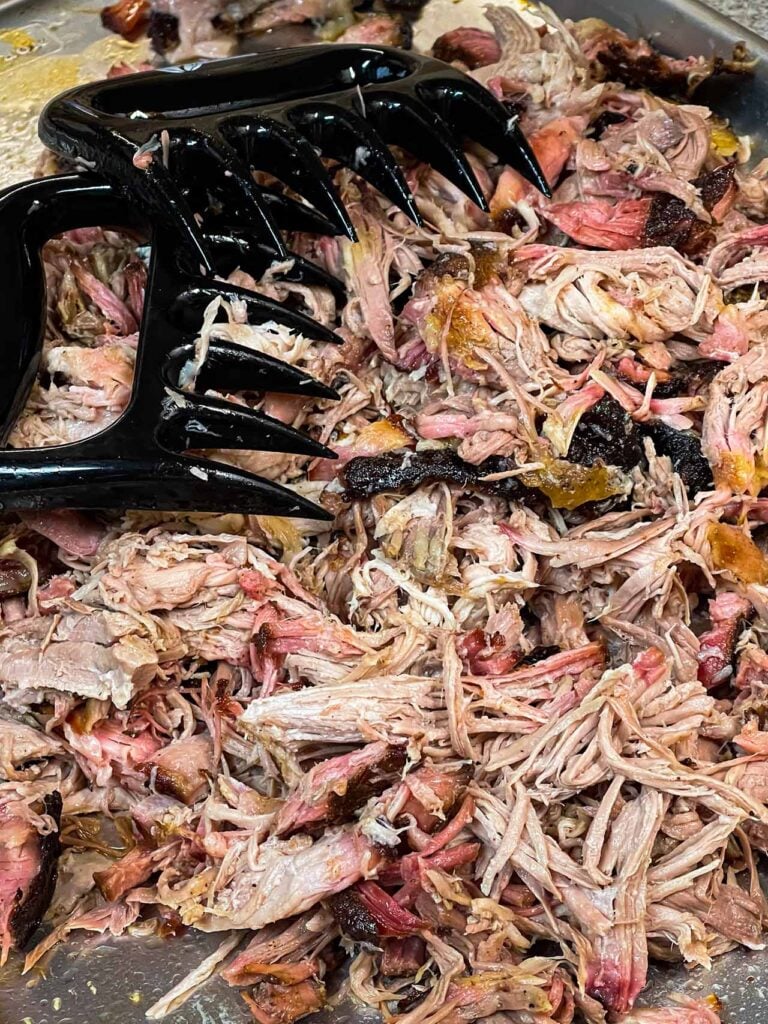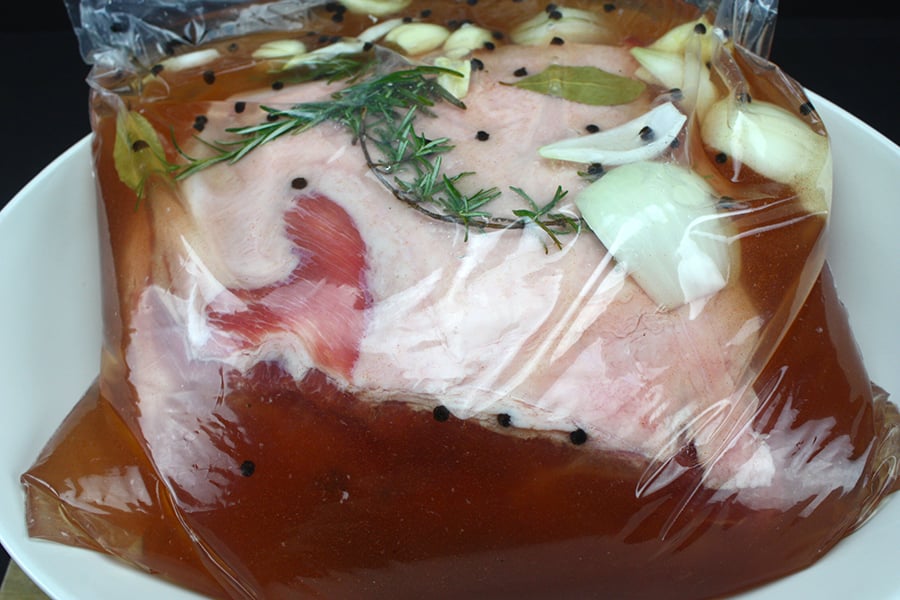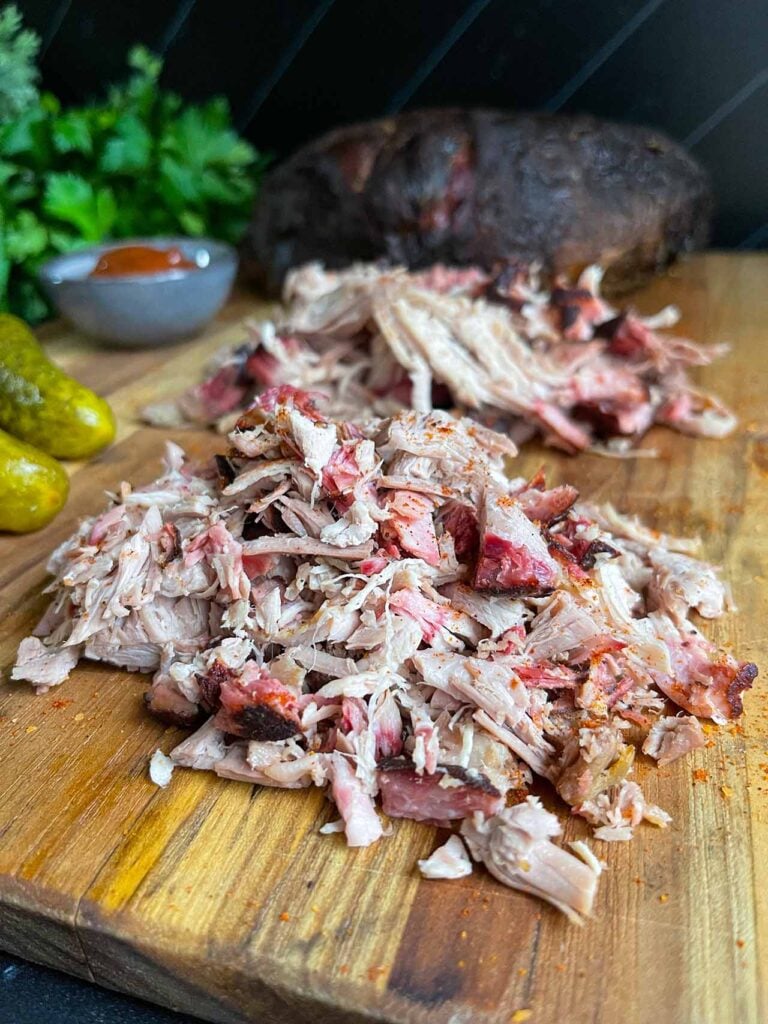This brine is for a pork shoulder (butt) but would work for basically anything. The flavors used are some very basic aromatics. The real power of brine is the salt.
Pork butt, also known as Boston butt or pork shoulder is a flavorful and versatile cut used for everything from pulled pork to roasts. Many recipes call for brining the pork butt prior to cooking. But is this step really necessary? Let’s explore the potential benefits and drawbacks of brining pork butt to help you decide if it’s right for your needs.
What is Pork Butt?
First, let’s clarify exactly what cut of meat pork butt refers to Contrary to what the name suggests, pork butt actually comes from the upper part of the front leg/shoulder area of the pig It contains a good amount of fat marbled throughout as well as connective tissue. Pork butt is often sold boneless with the skin removed.
This is considered a tough cut of pork that benefits from long, slow cooking methods like roasting, smoking, or braising. When cooked properly for several hours, the fat renders and the connective tissue breaks down into succulent, pull-apart meat. The resulting pork butt is incredibly flavorful and moist.
Why Would You Brine Pork Butt?
Brining is the process of soaking meat in a saltwater solution known as a brine. In addition to salt brines often contain sugar spices, and herbs to add flavor. There are several potential benefits associated with brining pork butt
Moisture Retention
The main purpose of brining is to help the meat retain moisture during cooking. As the meat soaks, the salt in the brine dissolves some of the muscle proteins on a microscopic level. This allows the meat to hold on to more moisture rather than losing it as the meat cooks.
Enhanced Flavor
The salt, sugar, and spice additions in a brine impart flavor to the meat. As the pork butt soaks, the seasonings infuse throughout the meat, enhancing its overall taste.
Tenderizes Meat
The salt in the brine also helps break down tough connective tissues in meats. This effect aids in tenderizing cuts like pork butt with abundant collagen.
Improves Texture
In addition to tenderizing, brining can also improve the mouthfeel and texture of the cooked pork. The added moisture keeps the meat juicy while the salt helps reinforce the structure for a pleasing texture.
Lengthens Freshness
Brining adds moisture and salt which helps inhibit bacterial growth. This can extend the usable shelf-life of raw pork butt by a few days.
Reduces Cooking Loss
The enhanced moisture retention means less liquid is lost as the pork cooks. Less cooking loss concentrates flavor.
Reasons You May Not Need to Brine
However, brining does come with some drawbacks. Here are some reasons why you may not need to brine pork butt:
Already Contains Ample Moisture
Pork shoulder has a good amount of internal fat running through it. This fat keeps the pork butt moist and flavorful, even without brining. The key is avoiding overcooking.
Extensive Cooking Time
Low and slow cooking methods for cuts like pork butt already introduce a lot of moisture in the form of steam and rendered fat over several hours. Brining beforehand becomes somewhat unnecessary.
Dilution of Flavor
The salt and water solution of a brine can actually dilute and wash out the pork’s natural flavors rather than concentrating them. This defeating the purpose of brining.
Textural Changes
Brined meat can sometimes end up mushy or too soft rather than tender if brined too long. This can be prevented by limiting brine time.
Added Difficulty
Brining requires managing another container in the fridge, monitoring brine time, disposing of used brine, and properly patting meat dry. Skipping it simplifies the prep work.
Introduces More Sodium
Each brine recipe contains varying salt amounts, but brining always increases the sodium content of the pork. This may not align with dietary needs.
Masks Quality
Lesser quality, old, or poorly butchered pork shoulder can benefit from brining to mask issues. But high-quality fresh pork may not need this flavor manipulation.
Tips for Brining Pork Butt
If you do wish to brine your pork butt, keep these tips in mind:
- Limit brining time to 12 hours or less to prevent over-brining.
- Thoroughly pat pork dry after brining before applying rubs or sauces.
- Chill brine before adding pork to avoid cooking meat.
- Clean and sanitize container, plate or bag holding pork in brine.
- Add aromatics like garlic, onions, or citrus to brine for extra flavor.
- Inject thicker cuts with brine solution to ensure even distribution.
- Reduce added salt in rub or sauce to account for brine.
- Discard used brine instead of reusing to prevent bacterial growth.
Alternatives to Brining
Here are some other options for keeping pork butt moist and flavorful without brining:
-
Injecting with broth, vinegar, fruit juice or marinade. Injecting penetrates deep into the meat.
-
Dry brine by heavily salting meat and refrigerating uncovered overnight to draw out moisture.
-
Marinating in an acidic liquid to tenderize and add flavor.
-
Rubbing with spices, herbs, oil and vinegar for a flavorful crust.
-
Basting/spritzing while cooking with juices, vinegar, soda or broth.
-
Ensuring ample fat cap remains for self-basting and moisture.
-
Cooking to proper internal temp, not overcooking.
Whether or not to brine pork butt comes down to your specific needs and preferences. If starting with a high-quality piece of meat, properly cooked, brining may provide negligible benefits. The ample fat and connective tissue in pork shoulder already ensures a moist and tasty result.
However, brining can offer some advantages like boosting flavor, improving texture, and allowing for slightly overcooked meat. If your goal is to amplify taste and tenderness, brining in a salt, sugar, and spice solution may be warranted. Just be mindful not to over-brine.
Understand the alleged pros and cons, and decide if this extra step is necessary based on the qualities of your meat, your cooking method, and the outcome you desire. With the right handling, seasoning and temping, a savory pork butt can be achieved both with and without brining. Trust your judgement, and tweak your process over time to find what works for your pork butt preparations.

Why The Recipe Works
Brining meat makes whatever you’re cooking come out all the juicier.
I am not going to get into the technical aspects of osmosis and salt ions . let’s keep it easy. Brining prevents dehydration while cooking, which means a much moister piece of meat.

A basic brine is made of salt, sugar, and some aromatics. We use rosemary, onion, bay leaf, peppercorns, paprika, cayenne, and garlic for this pork shoulder brine.
You can add whatever flavor profile you like.

How To Prepare The Brine
Some brine recipes will tell you to use hot water. This is not necessary at all. Feel free, but you can’t add your meat to the brine until it cools.
Do what you like, but the salt and sugar dissolve just fine in room-temperature water.
In a large bowl or pot, dissolve the kosher salt and sugar in 10 cups of water.

Once the salt and sugar are dissolved, get yourself a receptacle for your meat. For us, we like to use a large ziplock bag.
That way, we can remove all the air and keep the meat fully submerged in the brine.
Put the pork in what you’re using, add all the remaining ingredients, and stir. Cover the meat and refrigerate.
If you use a plastic bag, put it in a roasting pan or a bigger bowl in case it leaks.
For our 8 pounds of pork, we’re going to marinate it for 18 hours, but overnight is fine. Smaller cuts of meat require less brining time.
I would not recommend going over 24 hours with the brine. This might produce a too-salty experience for some.
Remove the pork from the brine and pat dry with paper towels.

Once it’s done brining, you’re ready to cook the meat as you will. For us, we’ll be applying a very tasty rub and doing up a fabulous smoked pork butt.
The main ingredient of every brine is salt. This one ingredient is what is going to flavor your meat. This is also what binds to the protein in the meat and stops the water from escaping while it’s cooking.
So it’s really up to you. The other things in the brine are the flavors that are added with the salt.
- Adding herbes de Provence, which are also known as Provencal herbs, makes the spice mix more typical of the southeastern France region. It goes perfectly with pork.
- It is made up of onion, celery, bell pepper, and garlic, which are known as the “trinity.” This makes everything pop, and the tastebuds come alive!.
- Other fun spice blends work well with this brine. It would work well with Honey Habanero, a citrus mojo spice blend, or any kind of sweet heat rub.
Pork butts should brine overnight for up to 24 hours. Smaller cuts of pork should go from 6-18 hours, depending on their size.
The salt enters the pork and binds to the protein. During the cooking process, this prevents the meat from releasing its water, thereby keeping the meat juicy. It also adds the flavors of the entire brine to the meat, not just to the outside.
No. You may need to remove things from it, such as peppercorns or other large items.
Yes. Refrigeration is required while brining.

Should You Brine Pork Butts — SIDE by SIDE Taste Test – Overnight Smoked Pork Butts on Pellet Grill
FAQ
Should I brine my pork for pulled pork?
Does brining pork make a difference?
Can pork be brined too long?
Why brine pork before smoking?
